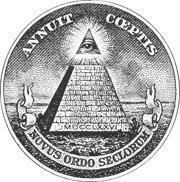CPT534 : SECRET SOCIETIES : novus ordo seclorum

EXAMPLE : ILLUMINATI
In the late 18th century, Adam Weishaupt was a professor at the University of Ingolstadt in Bavaria. He believed in the abolition of both government and organized religion, so much so that on May 1, 1776 he started a little social club to that end. The original group began with five members and was called The Order of Perfectibilists. Later it was renamed the Order of the Illuminati, and this enterprise spread throughout central Europe.
From its inception, the first rule of the Illuminati was DO NOT TALK ABOUT THE ILLUMINATI. Because of its controversial aims, the club had to keep its agenda and even its existence a strict secret. In written correspondence, members used a code to refer to dates, locations, and individual members. Weishaupt's codename was "Spartacus."
Professor Weishaupt joined a German strain of Freemasonry in 1777, being initiated in Munich. He immediately began to poach from the ranks of his fellow Masons to fill out his own clandestine group. This recruitment continued unabated until he was finally caught and expelled from the Freemasons.
Eventually, somebody spilled the beans about Weishaupt's project and the ideals to which it was dedicated. All of a sudden, he become one of the most hated men in Europe. He had simultaneously managed to rile both church and state.
The end result was a crackdown on secret societies across the board. In June 1784, both the Masons and the Illuminati were declared illegal by the King of Bavaria. Weishaupt fled to Gotha, a city in eastern Germany, to escape arrest. There he lived out the rest of his days.
The year on the pyramid is 1776, which is the date of the signing of the Declaration of Independence.
Nothing says "Big Brother" quite like a hovering eyeball."
- PARAPHRASE FROM DAILYROTTEN.com

0 Comments:
Post a Comment
<< Home